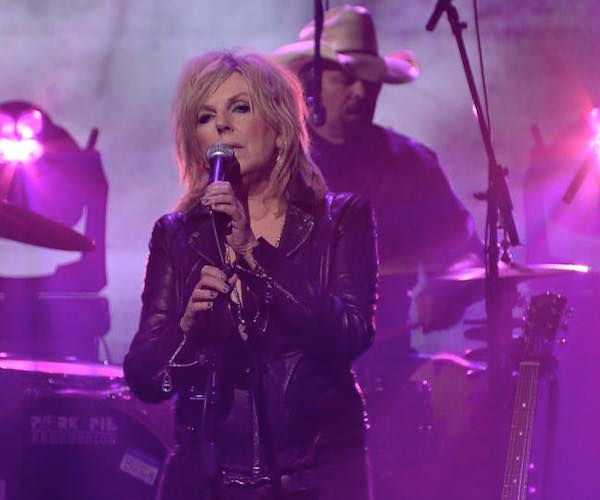Concert Review: Singer-Songwriter Lucinda Williams — On a Creative Jag
Give Lucinda Williams her credit as one of the few songwriters who seem to realize that the messiness of later life is just as loaded with song angles as the restlessness of youth.

Lucinda Williams on tour. Photo: courtesy of the artist.
By Brett Milano
Everything about Lucinda Williams’ show at the Paradise on March 21 was stripped down. There was no staging to speak of and in terms of stage patter, almost no speaking at all (the only full-fledged song intro in the main set was a dedication to recently deceased songwriter Steve Young). Her band, as usual, was a tight guitar-led three-piece that kept any unnecessary frills (and maybe a couple of necessary ones) out of the arrangements. And of course, there was the emotional nakedness of the songs, her stock in trade for decades now.
Williams has been on a creative jag lately; the current The Ghosts of Highway 20 is her second double CD in two years. And give her credit as one of the few songwriters who seem to realize that the messiness of later life is just as loaded with song angles as the restlessness of youth—In other words, you don’t have to stop writing songs about obsessive love and sex just because you’ve started writing songs about mortality. She touched both of those bases at the end of Monday’s set: “Dust”—the leadoff track from Highway 20—is an ode to crippling depression, set to one of her more gorgeous melodies. That was followed by “Honey Bee,” a wild blues rocker whose lyrics demand a little physical love, immediately. There’s seemed nothing contradictory about putting those two songs together; instead they just evoked deep sadness and one way of resolving it.
Looking rather splendid in a low-cut black dress and leather jacket, Williams’ vocals were free of the shakiness and slurring on some of the recent albums; suggesting that she’s in a good place personally. And though the tour is playing small venues to suit the subtlety of the Highway 20 material, she actually played fairly little from that album (though Tuesday’s setlist promises to be largely different). Instead she did something close to a greatest-hits set, going back to her self-titled 1988 album for the oft-covered “Changed the Locks.” The one song that didn’t quite come off was “West Memphis”—one of her few outright message songs, in part became the events described (the jailing of three teenagers on a probably false murder charge) was old news by the time she wrote it. But that was made up for by Highway 20, which dealt with the South’s darker secrets in more impressionistic terms.
The surprises came in the encore, which included two covers and her only political statement of the night: Woody Guthrie’s “I ain’t Got No Home” was played in honor of the recent revelation that the landlord Guthrie hated at the time was Donald Trump’s father (and Trump junior got dissed by name in an added verse). Neil Young’s “Rockin’ in the Free World” was the end-of-night fist-waver. In between came one of her best-known songs, ”Joy”—a brittle rant about the ex-lover who took it from her, and a promise to find her joy in West Memphis or Slidell. But on Monday she didn’t even have to go that far—When the Young song came around, it was the sound of her joy being snatched back.
Brett Milano has been covering music in Boston for decades, and is the author of Vinyl Junkies: Adventures in Record Collecting (St. Martins, 2001) and The Sound of Our Town: A History of Boston Rock & Roll (Commonwealth Editions, 2007). He recently returned from New Orleans where he was editor of the music and culture magazine OffBeat. His latest book is Don’t All Thank Me At Once (125 Records), a biography of the unsung pop genius Scott Miller, who led the bands Game Theory and The Loud Family.
